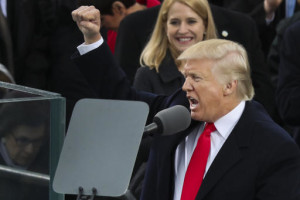
President Donald Trump pumps his first at the end of his speech after bring sworn in as the 45th president of the United States during the 58th Presidential Inauguration at the US Capitol in Washington, Friday, Jan. 20, 2017. (Photo by ANDREW HARNIK/AP)
TOKYO — Asian leaders have expressed hope that United States President Donald Trump will deepen alliances and further common interests in a flurry of congratulatory messages, but these belie a sense of unease over the pugnacious “America first” approach as spelt out in his inauguration speech.
In a series of rallies across the region, people spoke out against the hate speech, xenophobia and misogyny that had characterized Trump’s election campaign.
Over 10,000 people took part in rallies in cities such as Sydney, Melbourne, Wellington, Tokyo and Manila.
“We hope people will raise their voices to demand fair treatment regardless of gender, the colour of their skin or sexual orientation,” housewife Katherine Hall, 49, told The Sunday Times in Tokyo, where 400 people gathered.
Japan
Prime Minister Shinzo Abe, who was the first world leader to meet Trump when the latter was President-elect, said he hopes to arrange an official meeting at the “earliest possible occasion (to) send a message to the world on the importance of the Japan-US alliance.”
This alliance, he said, is the “linchpin” of Japan’s foreign and security policies. “I’d like to further strengthen the unwavering ties between Japan and the US, based on the relationship of trust between us.”
A meeting could take place early next month, local media reported.
The Mainichi daily quoted Masahiko Komura, vice president of the ruling Liberal Democratic Party, as saying: “If each country begins focusing only on itself, the economic state of the world – including the US – will be disastrous.”
Taiwan
President Tsai Ing-wen tweeted yesterday that she looks forward to “advancing the friendship and partnership” with the US, which her office said was its “most important international ally.”
Former premier Yu Shyi-kun, who attended the inauguration ceremony, said in Washington that Taiwan-US ties are at a “historic high.”
South Korea
Acting President Hwang Kyo Ahn, in his message to Trump, stressed close cooperation to jointly curb the nuclear development of a belligerent Pyongyang.
But media reports have questioned if Trump will be able to deftly resolve the issue, with Yonhap news agency saying Trump has “put the rest of the world on edge.”
The Korea Herald added that the country’s “withering economy will be put to the test” with Trump’s likely protectionist trade policies.
India
Prime Minister Narendra Modi tweeted his hopes to further deepen ties and “realize the full potential of India-US cooperation” with Trump.
But media reports note that India, which has been actively wooing US investment, might suffer from Trump’s inward stance. There are also worries that Trump’s anti- immigration stance will lead to curbs on the H-1B non-immigrant visa programme used to send Indian workers to the US.
Malaysia
Prime Minister Najib Razak said on Facebook that he was confident bilateral ties will strengthen.
“(Mr. Trump) takes office after an extraordinary journey which showed that politicians can never take voters for granted. He spoke for an America that felt it had been ignored for too long. Now is the time to govern for all Americans.”
Philippines
Manila respects Trump’s “America First” policy, which mirrors President Rodrigo Duterte’s own approach to his people, presidential spokesman Ernesto Abella said.
“Our diplomatic ties need to reflect our longstanding relationship, but under terms and conditions that protect our people’s interests,” he added.